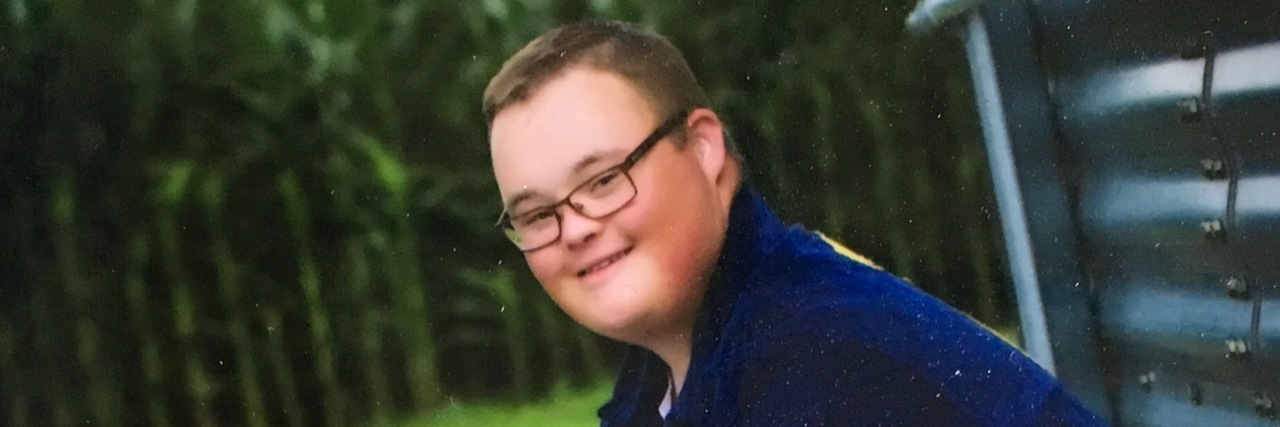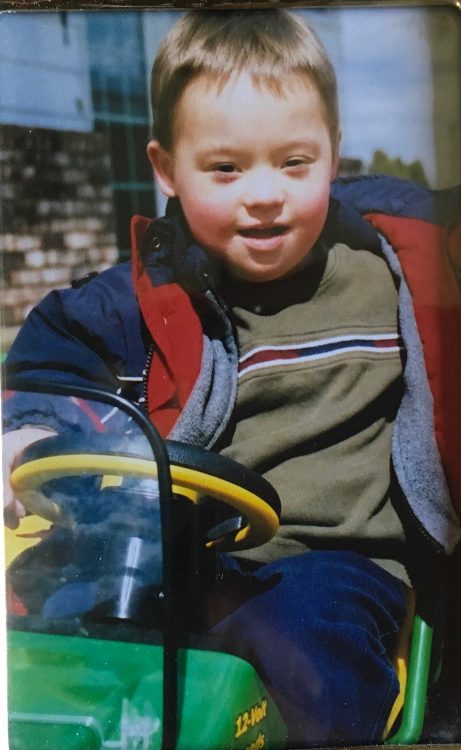From the time my son was very young he had an idea of what he wanted his life to look like. He had dreams, just as any other child has dreams. The stumbling block for me was “the list” in my head given to us when he was diagnosed with Down syndrome. If you have a child with a disability, you may know of “the list,” or a version of it. It’s the list given to parents by well-meaning professionals at the time of a child’s diagnosis. It’s the list of the things your child will never do, or alternatively, will struggle to do. It is a daunting list. It’s the stuff your child likely will not do or potentially not do with ease: walking, talking, toilet training, reading, writing, holding a job, driving, marrying, having a family, living a long, healthy life. It’s the prophecy handed to a parent at potentially their most vulnerable moment. You get the picture; this list carries a lot of weight. In the minds of the parents of children with disabilities, if not kept in check, this list can become a child’s destiny.
As I said, my son had dreams. As his parents, our job has been trying to help him achieve those dreams. Our son taught us early on “the list” would not rule or control his life — lesson number one.
My husband and I prayerfully began the mission of following our son’s lead and supporting him in the pursuit of those dreams.
Our family farms. We live on our family’s multigenerational farm and my son’s generation is the fifth to raise crops on it. Farming is as imbedded in the hearts of this family as is the soil on the work boots they wear each day. My son seemed to know from birth that he would farm. For him, it’s not just an occupation but a calling. If you farm, you may understand.
So how does a kid with Downs syndrome become a farmer? He sets goals. Our son made a list of goals in early high school as a project for an agriculture class. He wrote that he would follow his dad, watching everything he did so he could learn. He said he would exercise and stay fit so he could be strong enough to work on the farm. He would learn to drive, so that when called upon to drive on the farm, he could.
His list also included some personal goals: he would have a girlfriend, and one day a wife. He would live on the family farm and one day take his father’s place, just as his dad had taken the place of his own father. This was our son’s list. His list of goals trumped “the list” given to us at the time of his diagnosis. Our son’s list was everything.
Today, our son is 20 years old and lives in an apartment on the family farm. My husband and I raised our family, two sons and a daughter, in a great big four-bedroom farmhouse. Before our children were born, we could never have anticipated that big farmhouse would convert so beautifully into two separate living quarters. We live in the main part of the house and our son has a lovely one-bedroom, one-bathroom apartment with a large eat-in kitchen, a living room, as well as front and back doors and the best view of the whole farm.
Our son earns his paycheck through hard work on the family farm. He helps my husband with daily livestock chores and assists in every other aspect of the farm as he is able. My husband calls our son his right hand, and he means it. When it’s time to move machinery from one farm to the next, our son brings up the rear to courier workers. He also delivers meals to the field. One of his favorite things is dinner as a group in the field during planting or harvest seasons — it’s a farming tradition.
One of the more heartbreaking items on the “the list” given to us at the time of our son’s diagnosis was that he would never drive. On the farm, if you can’t drive, your life can be a bit confining. A basic need in our world today is to be able to transport oneself from place to place, and farming requires more driving than many jobs. As a child, our son planned to drive and pretended to all the time. I wondered how I could ever break the news to him that he could not. Early in his life, at one of the seemingly endless doctor’s visits, I asked a genetic specialist why my son couldn’t drive. His response was something vague about an inability to master spatial relations or reasoning, which truthfully meant nothing to me at the time. It did, however, make me wonder. In all my reading and research about Down syndrome and how best to help my son overcome the obstacles that accompanied the diagnosis, I encountered a common theme: early intervention. All roads pointed to the theory that the earlier you intervene, the better your child will fair. My son received early intervention and therapy on virtually all fronts. I couldn’t teach a 4-year-old to drive. Or could I?
If in fact a child’s brain is like a sponge when they are small, then it seemed logical to me that our son needed to master his space and the objects around him when he was small. I theorized that we needed to capitalize on that opportunity. So we purchased a child’s battery-operated John Deere Gator and turned him loose — little to lose, much to be gained. He very eagerly drove the tiny car around the yard, running into this and bumping into that. In time, he wasn’t running into things anymore and my husband began adjusting the speed governor bit by bit, letting him go faster and faster. Before we knew it, he was safely zooming from one corner of the farm to the next! He was driving before he’d even mastered speech and could completely articulate his dreams. Our son learns best from experience — lesson number two.
One day we found him in the field on the edge of the homestead, lifting rocks into the back of his little gator, acting out what he’d seen done over and over again. He was clearing the rocks away for spring planting. It had begun; he was farming.
Ultimately, my son moved on from a child’s toy to actual farming implements. He acquired his driver’s license at age 18 after passing both, a written and driving test for the driving examiner. Today, he drives independently where he wants and needs to go. We have an agreed upon safe-zone and he communicates his location with every stop to keep us informed of his whereabouts. He doesn’t like to drive in the bigger cities and asks us to take the wheel in those places. He’s a very safe and capable driver.
A typical day in our son’s life begins with chores, after which he makes himself available to whatever tasks my husband gives him around the farm. Days on the farm can be very long. His day ends with dinner he prepares for himself in his apartment and an episode or two of “Glee,” his all-time favorite show, which he binge watches at every opportunity. Our son cooks a variety of favorite dishes well and is beginning to expand his cooking repertoire. Rather than preparing something simple, he is beginning to create. The other day he sent me a very delicious looking snap-shot of the fish tacos he prepared.
While life on the farm as a whole includes a good bit of social interaction, our son has a separate social life as well. He tries to get to the local coop at least once during the week to check in and have a game of cards with the coop manager. He loves to sing and sings in the church choir and recently performed in a community variety show, all of which requires commitment and regular practices. He has a monthly dinner date out with a friend, and is working to organize a group game night in his apartment once a month. At least once a week he usually attends a sports event at the school or invites a friend or two for dinner in his apartment.
He earns money on the farm so he buys what he needs, and though he’s quite frugal, he’s good to himself and gets some of what he wants. He purchased his own car with money he earned. He dreams of buying farm ground one day. He likes to grocery shop and we go to town together once a week or so and divide and conquer our separate grocery lists. He’s a good steward of his finances but also generous with the people he loves. He is very helpful, wanting to serve whenever he can and always has money for the collection plate at church. He is frequently asked to serve as guest-speaker at a nearby university, speaking to pre-service educators about the importance of inclusive classrooms and communities and the impact inclusion has had on his own life. He’s a good son and brother and a favorite uncle to his niece. The other day he asked me to order a couple little dresses for him to give to his niece. He’s very thoughtful that way.
He doesn’t have a wife yet. He has had a girlfriend in the past, but is currently single. He hopes he will have that companionship in his life again someday. I believe he will.
My son has defied “the list” in every way.
When our son was a baby and we received the diagnosis of Down syndrome along with that awful list, I struggled to imagine his life as an adult. As a whole, the childhood part was simple. There was a lot of therapy and work to overcome obstacles and of course there was worry, but I rejoiced in every single milestone despite the fact that his was a different timeline than his brother and sister. Most of the time spent on worry related to the future. I just could not visualize how our son would enjoy independence and fulfillment if that damned list was to be his future.
I wish someone had told me how wonderful and fulfilling his life could turn out to bet. I wish in those moments of fear, as I pondered that dreaded list I’d have known of the possibilities. I squandered an awful lot of time worrying. I want new parents of kiddos with Down syndrome to know what I have learned — what my son has taught me. I want them to know that a fulfilling life has nothing to do with diagnoses or a hypothetical list. Fulfillment comes from living the life one chooses — lesson number 3.
My son lives a fulfilling and enriched life. He lives a valuable life! I want parents of children with Down syndrome to know that it’s going to be OK, and that time spent worrying is time lost and it’s good to believe in something more than that list.
Please don’t let that list define your child. Let your child lead and set the pace — you support and follow.
We don’t have it all figured out yet, but it feels like we’re on the right road. We have lessons yet to be learned and mistakes to be made. Our son still has goals to achieve. The plan keeps evolving in pursuit of his dreams. This is just the beginning of his story, but we believe one thing is certain: life is good and there is most definitely happiness ahead.


